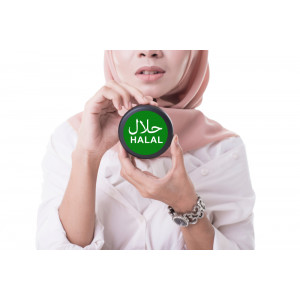Требования халяль к косметике
Требования халяль к косметике
Свод стандартов Халяль предписывает требования, вопреки расхожему мнению, не только к пищевым продуктам, но и к парфюмерно - косметическим средствам, украшениям, одежде и даже образу жизни. В данной статье мы будем рассматривать основные критерии, благодаря соблюдению которых косметика и косметическая продукция могут относиться к разрешенной мусульманской религией.
Для того, что бы косметика считалась халяль, она не должна в первую очередь наносить вред человеку, который ее использует. Компоненты не должны быть токсичными и содержать вредоносные вещества в своем составе. Именно благодаря этому пункту халяльная косметика и продукция в целом становится выбором не только последователей религии Ислам. Люди, проявляющие осознанность в выборе ухода за своим телом все чаще отдают предпочтение косметике Halal. Этот знак на товарной упаковке уже давно стал символом качества и добросовестности производителя.
Спирт
Косметика для мусульманских женщин не содержит в своем составе спирт в любом его проявлении. Подобный запрет обусловлен в первую очередь религиозными ограничениями. Данное вещество считается нечистым, а потому исключено для применения в составе любого продукта. С точки зрения ухода за телом подобный запрет вполне обоснован. Спирт и спиртосодержащие компоненты при попадании на дерму способствуют ускоренному испарению влаги. При частом использовании такого средства, вы непременно доведете свою кожу до обезвоживания.
Alcohol – это вещество часто используется в качестве компонента, способствующего высокой проницаемости кожи и оказывающего антисептическое воздействие. С заявленными качествами ингредиент действительно справляется. Но вспомним о том, что нам посчастливилось жить в 21 веке. Эра технологий и революционных открытий во всевозможных областях заинтересованности человека. Современная индустрия уходовых средств насыщена рядом более благородных веществ, оказывающих благотворное, чем спирт, воздействие на кожу человека. Предпочтение таким элементам отдают производители халяльной косметики.
Животные компоненты
Важным требованием к составу косметики является отсутствие свинины в любом виде на производстве и в качестве ингредиента в средстве. Большая часть производителей косметики используют в своем составе компоненты животного происхождения. Это могут быть экстракты насекомых, свиной жир, компонентны секрета различных животных. Создатели халяльной косметики стараются придерживаться принципа экологичности собственной продукции. Свинина считается нечистым зверем, и полностью отсутствует в жизни мусульман.
Так же использование ее в качестве образца для проверки реакции организма исключено. Тестирование продукции на любом из животных считается изжившей себя привычкой прошлых лет. Современные технологии позволяют исключить контакт с животным в ключе тестового образца. К примеру клетки нового поколения IN - VITRO позволяют получать более точные данные о реакции человеческой кожи на тот или иной ингредиент. Свиной жир, который полюбился изготовителями в качестве увлажняющего компонента, также считается варварским и диким ингредиентом в наше время. Аналогом является глицерин растительного происхождения. Его действие куда привычнее для кожи и не несет вреда. Чего не скажешь о любом жире животного происхождения. В 21 веке нет нужды уподобляться жителям прошлых веков, наносить на свою кожу звериные останки. Это не эстетично и не экологично.
Именно такая позиция приходится по вкусу не только представителям Исламской культуры, но и приверженцам зеленого движения. Все чаще люди, осознающие важность гармоничного существования на земле, отдают предпочтения косметике халяль, потому что уверены в добросовестности производителя и исключительном качестве продукции. Подобный выбор обоснован строжайшим контролем каждого этапа создания косметики. Подобное отношение обусловлено не только добросовестностью производителя, но и богобоязненностью производителей. Все, что не халяль, или произведено с пренебрежением технологии изготовления - является харам. С арабского языка это переводится как «запрещенный». Для мусульман харам - недопустимо и считается большим грехом.
